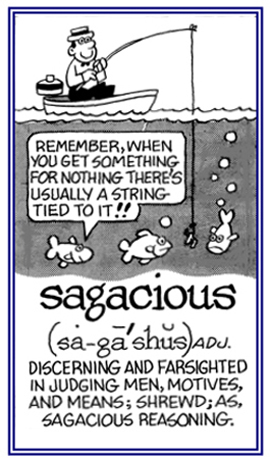sag-, sagaci- +
(Latin: wise, shrewd; keen perception)
1. A sign or warning of some future occurrence: When Sam saw the black clouds appearing in the sky, he thought that they were a presage of an impending catastrophe.
2. A feeling that a particular thing, often something unpleasant, is about to happen; ill-omen: Ted wasn't sure, but he had a strong presage that he wasn't going to live much longer!
2. A feeling that a particular thing, often something unpleasant, is about to happen; ill-omen: Ted wasn't sure, but he had a strong presage that he wasn't going to live much longer!
presage, presages, presaged, presaging (verb forms)
1. To be or to give a sign or warning of a future event: "The dark skies that night presaged violent weather conditions."
2. To know intuitively that a particular thing is going to happen.
3. To predict a future event: "Many investors are very worried that the current slowdown could presage another recession."
2. To know intuitively that a particular thing is going to happen.
3. To predict a future event: "Many investors are very worried that the current slowdown could presage another recession."
"There was nothing that presaged the earthquake and tsunami that hit Japan in March, 2010."
4. Etymology: "something that portends" (indication that something is going to happen), from Latin praesagium, "a foreboding" from praesagire, "to perceive beforehand, to forebode", from praesagus, "foreboding" which came from prae-, "before" + sagus, "prophetic"; and is related to sagire, "to perceive".
sagacious (adjective), more sagacious, most sagacious
1. A reference to a person who shows sound judgment and keen perception; wise: Sam Jones chose the most sagacious, informed, and judicious lawyer in town to defend his case in court.
2. Pertaining to the ability to understand difficult ideas and situations and to make good decisions: The educational counselor gave the student sagacious advice about preparing to go to a university after graduating from his high school.
3. Descriptive of an individual having a profound knowledge and understanding of the world combined with intelligence and good judgment: To Timmy, grandpa seemed to be such a sagacious and insightful man being able to answer all of his questions about things going on around him.
4. Etymology or origin: from Latin sagax-, sagac-, "quick witted, wise."

© ALL rights are reserved.

© ALL rights are reserved.

© ALL rights are reserved.
Go to this Word A Day Revisited Index
2. Pertaining to the ability to understand difficult ideas and situations and to make good decisions: The educational counselor gave the student sagacious advice about preparing to go to a university after graduating from his high school.
3. Descriptive of an individual having a profound knowledge and understanding of the world combined with intelligence and good judgment: To Timmy, grandpa seemed to be such a sagacious and insightful man being able to answer all of his questions about things going on around him.
4. Etymology or origin: from Latin sagax-, sagac-, "quick witted, wise."



Go to this Word A Day Revisited Index
so you can see more of Mickey Bach's cartoons.
sagaciously
1. In a discerning, insightful, and perceptive approach to issues.
2. A descriptive term for a keen and farsighted penetration and judgment of a situation.
3. In a sagacious manner or in a way that is clever, shrewd, keen of intellect or discernment; as well as, being cunning; such as, with ability and aptitude.
2. A descriptive term for a keen and farsighted penetration and judgment of a situation.
3. In a sagacious manner or in a way that is clever, shrewd, keen of intellect or discernment; as well as, being cunning; such as, with ability and aptitude.
sagaciousness
1. Having or showing keen discernment, sound judgment, and farsightedness.
2. Characterized by keen awareness, sharp intelligence, and often a sense of what is practical.
3. Having or showing keen awareness, sound judgment, and often resourcefulness; especially, in practical matters.
2. Characterized by keen awareness, sharp intelligence, and often a sense of what is practical.
3. Having or showing keen awareness, sound judgment, and often resourcefulness; especially, in practical matters.
1. Acuteness of mental discernment; aptitude for investigation or discovery; keenness and soundness of judgement in the estimation of persons and conditions, and in the adaptation of means to ends; penetration, shrewdness: Floyd was known for his sagacity by having profound knowledge and understanding, coupled with foresight and good judgment.
2. Etymology: from Middle French sagacité which came from Latin sagacitatem, sagacitas, "quality of being acute", from sagax, sagacis, "of quick perception", related to sagus, "prophetic", and sagire, "to perceive keenly".
2. Etymology: from Middle French sagacité which came from Latin sagacitatem, sagacitas, "quality of being acute", from sagax, sagacis, "of quick perception", related to sagus, "prophetic", and sagire, "to perceive keenly".
sage
1. A reference to a person who is considered to be wise, discreet, and judicious.
2. Practically wise, rendered prudent or judicious by experience.
3. With reference to advice, conduct, etc.; characterized by profound wisdom; based on sound judgement.
4. Exhibiting sageness or profound wisdom.
5. A man of profound wisdom; especially, one of those people in ancient history or legend who were traditionally famous as the wisest of mankind; hence, one whose exceptional wisdom entitles him to a degree of veneration or respect.
6. Etymology: "wise" from Old French sage, from Latin sapere, "to have taste, to have good taste or discernment, to be wise".
2. Practically wise, rendered prudent or judicious by experience.
3. With reference to advice, conduct, etc.; characterized by profound wisdom; based on sound judgement.
4. Exhibiting sageness or profound wisdom.
5. A man of profound wisdom; especially, one of those people in ancient history or legend who were traditionally famous as the wisest of mankind; hence, one whose exceptional wisdom entitles him to a degree of veneration or respect.
6. Etymology: "wise" from Old French sage, from Latin sapere, "to have taste, to have good taste or discernment, to be wise".
<img src="/img/left_arrow_sm.gif" alt="" /> <img src="/img/right_arrow_sm.gif" alt="" />
Showing 1 page of 7 main-word entries or main-word-entry groups.
